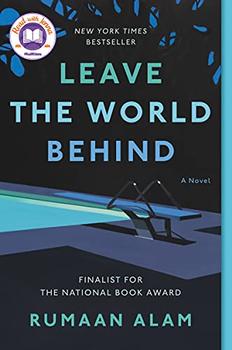Summary | Excerpt | Reviews | Beyond the Book | Readalikes | Genres & Themes | Author Bio

1
WELL, THE SUN WAS SHINING. THEY FELT THAT BODED WELL—
people turn any old thing into an omen. It was all just to say no clouds were to be seen. The sun where the sun always was. The sun persistent and indifferent.
Roads merged into one another. The traffic congealed. Their gray car was a bell jar, a microclimate: air-conditioning, the funk of adolescence (sweat, feet, sebum), Amanda's French shampoo, the rustle of debris, for there always was that. The car was Clay's domain, and he was lax enough that it accrued the talus of oats from granola bars bought in bulk, the unexplained tube sock, a subscription insert from the New Yorker, a twisted tissue, ossified with snot, that wisp of white plastic peeled from the back of a Band-Aid who knew when. Kids were always needing a Band-Aid, pink skin splitting like summer fruit.
The sunlight on their arms was reassuring. The windows were tinted with a protectant to keep cancer at bay. There was news of an intensifying hurricane season, storms with fanciful names from a preapproved list. Amanda turned down the radio. Was it sexist, somehow, that Clay drove, and always did? Well: Amanda had no patience for the attendant sacraments of alternate-side-of-the-street parking and the twelve-thousand-mile checkup. Besides, Clay took pride in that kind of thing. He was a professor, and that seemed to correlate with his relish for life's useful tasks: bundling old newspapers for recycling, scattering chemical pellets on the sidewalk when the weather turned icy, replacing lightbulbs, unclogging stopped sinks with a miniature plunger.
The car was not so new as to be luxurious nor so old as to be bohemian. A middle-class thing for middle-class people, engineered not to offend more than to appeal, purchased at a showroom with mirrored walls, some half-hearted balloons, and several more salesmen than customers, lingering in twos or threes, jingling the change in the pockets of their Men's Wearhouse slacks. Sometimes, in the parking lot, Clay would approach some other iteration of the car (it was a popular model, "graphite"), frustrated when the keyless entry system failed to engage.
Archie was fifteen. He wore misshapen sneakers the size of bread loaves. There was a scent of milk about him, as there was to young babies, and beneath that, sweat and hormone. To mitigate all this Archie sprayed a chemical into the thatch under his arms, a smell unlike any in nature, a focus group's consensus of the masculine ideal. Rose paid better attention. The shadow of a young girl in flower; a bloodhound might find the metal beneath the whiff of entry-level cosmetics, the pubescent predilection for fake apples and cherries. They smelled, everyone did, but you couldn't drive the expressway with the windows open, it was too loud. "I have to take this." Amanda held the telephone aloft, warning them, even though no one was saying anything. Archie looked at his own phone, Rose at hers, both with games and parentally preapproved social media. Archie was texting with his friend Dillon, whose two dads were atoning for their ongoing divorce by letting him spend the summer smoking pot in the uppermost floor of their Bergen Street brownstone. Rose had already posted multiple photographs of the trip, though they'd only just crossed the county line.
"Hey Jocelyn—" That telephones knew who was calling obviated nicety. Amanda was account director, Jocelyn account supervisor and one of her three direct reports in the parlance of the modern office. Jocelyn, of Korean parentage, had been born in South Carolina, and Amanda continued to feel that the woman's mealy-mouthed accent was incongruous. This was so racist she could never admit it to anyone.
"I'm so sorry to bother you—" Jocelyn's syncopated breath. It was less that Amanda was fearsome than that power was. Amanda had started her career in the studio of a temperamental Dane with a haircut like a tonsure. She'd run into the man at a restaurant the previous winter and felt queasy.
From Leave the World Behind by Rumaan Alam. Copyright 2020 Rumaan Alam. Excerpted by permission of Ecco, an imprint of HarperCollins.
Education is the period during which you are being instructed by somebody you do not know, about something you do ...
Click Here to find out who said this, as well as discovering other famous literary quotes!
Your guide toexceptional books
BookBrowse seeks out and recommends the best in contemporary fiction and nonfiction—books that not only engage and entertain but also deepen our understanding of ourselves and the world around us.